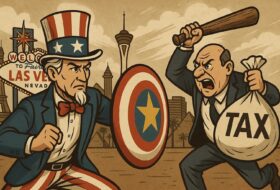
One lucky Ontarian will soon be millions of dollars richer, having found the one-of-a-kind “One Ring” in a pack of Magic: the Gathering cards. Wizards of the Coast (WotC), which publishes the game, included the special card in its latest Tolkien-themed game expansion as a promotion. The customer who found the card has chosen to remain anonymous. However, they told CBC News that they work in retail and live in Toronto.
Professional Sports Authenticator has confirmed the card’s authenticity and graded it as being in mint condition. Pulling such a card is a life event on par with winning the lottery.
The card’s owner is now working through agents to coordinate a sale. How much they get for it remains to be seen. Already there has been a public offer of €2 million (US $2.2 million). The Spanish card vendor making that bid has sweetened it with an offer of free travel to Valencia to deliver the card in person, plus a paella dinner.
Assuming the vendor makes good on that offer – or the card’s owner finds and accepts an even better one – the One Ring will officially become the most expensive Magic: the Gathering card in history. To date, the record is reportedly $800,000. Rapper Post Malone told Howard Stern that’s the amount he paid for a signed artist proof of a Black Lotus. It has generally held the reputation as the most coveted card in the game since its early days.
What is the ‘One Ring’?
Magic: the Gathering was the world’s first collectible card game (CCG), with its Alpha launch in 1993. It remains the most popular, both as a physical product and now in digital form.
CCGs took the gaming world by storm, combining the fun of conventional board and card games with the thrill of opening a pack of trading cards. Players value cards both for their rarity and their utility in the game. Cards that are both very rare and strategically important can fetch high prices, particularly once the set that includes them has gone out of print.
WotC, which owns the game, is now a subsidiary of Hasbro. That gives it the clout to license premium intellectual property for use in the game’s expansions. The latest of these is the Tolkien-themed Lord of the Rings: Tales of Middle Earth.
That set contains non-unique, standard versions of the One Ring card. These allow the owner to draw additional cards at the cost of an ongoing drain on their life points. The unique One Ring features different artwork, and its card text is written in “The Black Speech of Sauron,” a fantasy language from the Tolkien novels.
Aside from the One Ring, there are only two other unique Magic: the Gathering cards. One of these was made as a prize for the game’s 1996 World Championship winner. The other, the Shichifukujin Dragon, commemorated the game’s launch in Japan. Tom Chanpheng, who won the Championship card, sold it in 2001 for $17,500, but its current value is likely in the hundreds of thousands. Hobby Japan owns the Shichifukujin Dragon and has never offered to sell it, making it effectively priceless.
Card Games Haven’t Avoided Loot Box Backlash
Finding the One Ring is obviously very exciting for the lucky player. However, it may also call more attention to the issue of whether randomized collectibles constitute gambling.
Much of that attention has recently been on video games and their “loot boxes.” However, physical trading cards have been around a lot longer, and so has the history of litigation against them.
Until the 1990s, most lawsuits about trading cards focused on whether Topps was violating anti-trust laws. However, as collectibles markets began to soar, the conversation turned to gambling.
There have been dozens of such cases, but perhaps the most important in the US on that topic was Schwartz v. Upper Deck Co. That case resulted from Upper Deck inventing the idea of ultra-rare chase cards, of which the One Ring is an extreme example.
The court deemed Upper Deck’s product to be equivalent to scratch-off lottery tickets and that it violated laws in New York and New Jersey. However, Upper Deck ultimately prevailed, getting the case dismissed for other reasons under the RICO Act.
Some companies have attempted to use sweepstakes law to protect themselves from the accusation of running a lottery. However, even that can be contentious. Panini and Topps are now facing lawsuits about whether their sweepstakes instructions were accessible to those who hadn’t made a purchase.
These cases all differ in their specifics. So far, Magic: the Gathering hasn’t been the target of such a suit, though WotC was named in Chaset v. Fleer/Skybox Int’l, relating to the Pokémon CCG.
It remains to be seen whether the presumably-high sale price of the One Ring moves the needle. However, headlines about its value seem like the sort of thing to pique interest among class action law firms and would-be plaintiffs.





